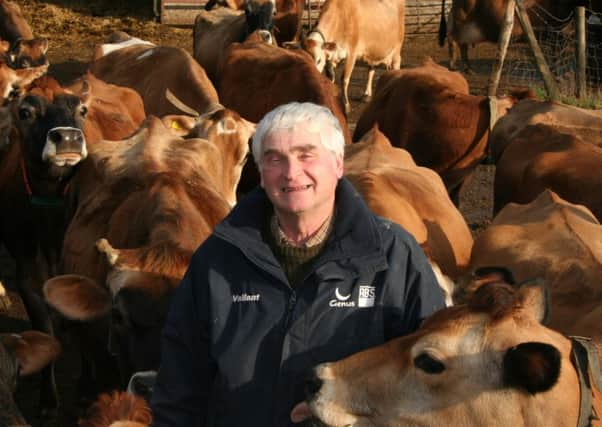Post-quota markets could hasten big dairy decisions


In their latest annual Outlook report, Andersons predict that only the smartest operators will be able to survive long-term now that European Union milk quotas have ended.
Since quotas finished at the end of March, there has been a significant increase in milk output from some European countries, consultants Mike Houghton and Tony Evans state in their report.
Advertisement
Hide AdAdvertisement
Hide AdThey added: “The decline in the milk price, together with increasing output worldwide, is likely to accelerate structural change within the UK dairy sector. There is little doubt that only the most efficient farmers can achieve a long and sustainable future at current prices.
“There are just under 9,700 producers in England and Wales and this might well reduce by between 30-50 per cent within the next three to five years, if prices remain low.
“Those remaining are likely to get larger and more efficient; we may well see an industry reduced to 5,000-6,000 dairy farmers, with an average herd size of between 250 and 300 cows.”
Their advice to farmers is to think hard about the milk price at which their business will be sustainable longer term, adding that this probably needs to be in the 26-28 pence per litre bracket.
Advertisement
Hide AdAdvertisement
Hide AdThey said there should be more discussions with the banking sector to find a way of funding businesses over the long term, to cope with milk price volatility, and that this might involve flexibility in capital repayments - halting them when the milk price is low and increasing them when markets are strong.
David Shaw, regional dairy board chairman for the National Farmers’ Union in Yorkshire and the North East, believes a further huge reduction in the number of dairy farmers need not be an inevitability.
Mr Shaw, who runs a dairy herd at Elvington near York, said: “Contracts are key. Farmers have to look at their contracts and make the best of it.
“On what I’m on there is a nine pence difference between the top and bottom price. Farmers need to focus on what is being demanded of their milk to achieve the best prices - whether that’s the level of fat or protein content, or something else.”
Advertisement
Hide AdAdvertisement
Hide AdBut he does see more farmers exiting the sector in the short-term, saying: “I’m not too despondent but we will lose a lot of farmers before March.
“If the spring comes and there isn’t positive movement farmers will make a decision for the year ahead.”
Ian Macalpine, chairman of the Royal Association of British Dairy Farmers, said he too expected the new year to lead to big decisions.
A recent RABDF survey suggested 49 per cent of producers would quit if low prices persist for the next six months.
Advertisement
Hide AdAdvertisement
Hide AdMr Macalpine said: “I think that figure will be less but certainly another six months, or even 12 months, of low prices and there will be a lot that can’t survive.
“And if we get an upturn, a lot will take the opportunity to get out while the price for stock is up, rather than wait for the next drop to come.”
EXCHANGE RATE HINDRANCE
Profitability prospects for farmers overall look little better for the year ahead after considerably lower returns this year, Andersons’ Outlook report suggests.
Current weak markets for produce are largely related to the strengthening of the pound against the euro by 15 per cent over two years which has made UK farm produce less competitive in the key EU market and makes imports relatively cheaper.
Advertisement
Hide AdAdvertisement
Hide AdThe report states: “Although currency markets are prone to sudden shifts, the relative strengths of the UK and Eurozone economies suggest that a figure of €1 to 75p is a reasonable forecast for 2016. Most markets look set to remain subdued.”